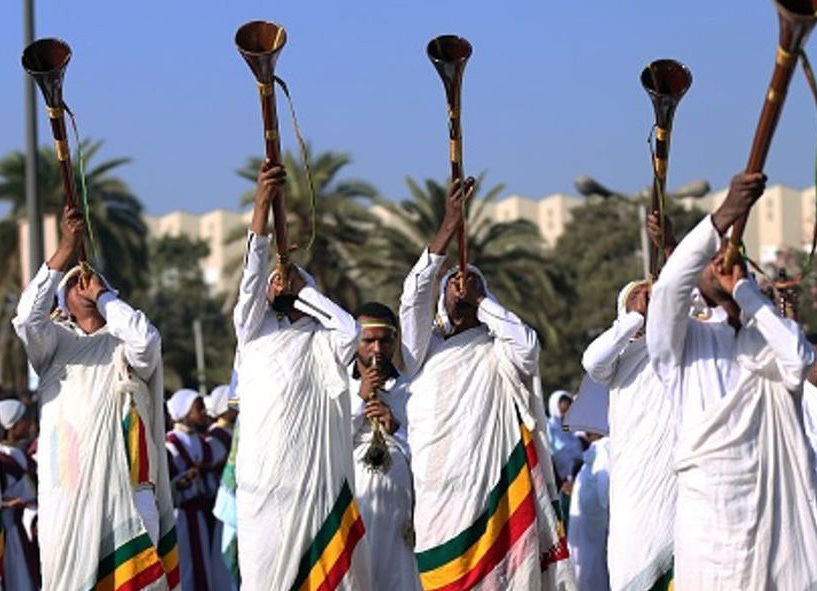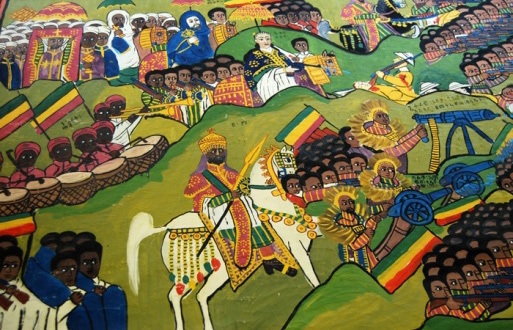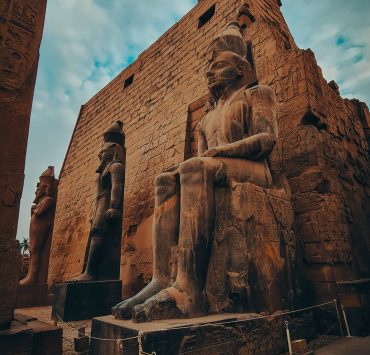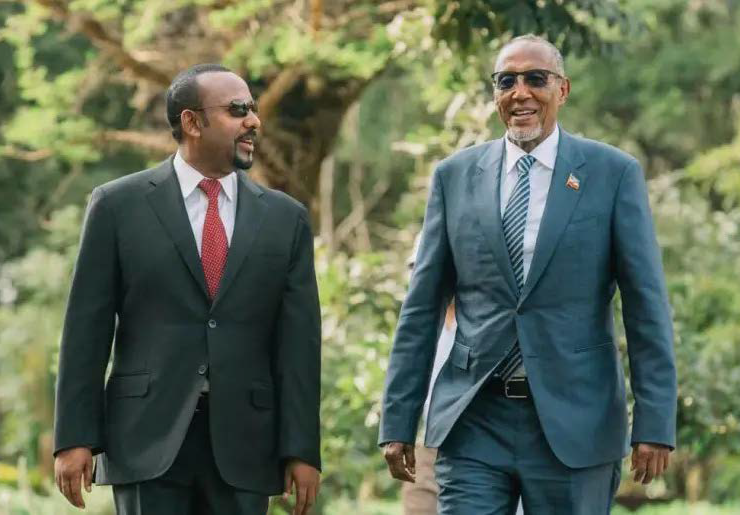The Battle of Adwa: An African Victory

Abel Merawi is from Addis Ababa. He is an English…
It was early Sunday morning on March 1, 1896. The place was Adwa. Two warring sides were holding position, ready to fight. On one side, there were the brave children of Ethiopia with their Emperor beside them. They were not all trained soldiers; they were people from all walks of life. Devoid of fear they stood there; ready to fight in a just war so as to defend their land and the freedom it represents. On the other side, there were the conceited Italian soldiers with their commanders. They were unwelcome visitors in the land of the free people. For them, justice was not an issue for they were blinded by the greed of an expansionist. They took black people for granted. Little did they know this was the day the white people tasted defeat for the first time. Behold! A single day, half a day to be exact, was all it took Ethiopia to defeat Italy.
The victory of Adwa is both historic and symbolic. For those who are willing to see, it represents true patriotism and the power of unity. Don’t worry; I am not going to bore you with the factual details of the battle by talking about how more than 100,000 Ethiopians fought in the war. I won’t talk of how Article 17 in the Treaty of Wuchale in 1889 was the cause of the war. These and similar facts can be found in history lessons and archives. But I will talk of how it became a beacon of hope for Africans. I will also talk about the symbolic lesson for present-day Ethiopia – a country lacking unity and abundant with false narration of ethnic and religious division.
Article 17 of the Treaty of Wuchale is symbolic as it speaks of the current demand of former Western colonizers and oppressors who canonized themselves as global defenders of democracy. The Italian version dictates that the Ethiopian king, ‘consents to avail himself’ to the Italian king in foreign affairs, while the Amharic version states that the Ethiopian king, ‘may, if he so desires, avail himself’ to the Italian king in foreign affairs. Currently, Westerners are demanding that Ethiopia should ‘consent’ to their standards of democracy. We, in the spirit of Adwa, will handle our internal issues and bring democracy by ourselves and will ask for their assistance if we only desire it. We are the Abyssinians who made a unified nation while Europeans were engaged in tribal wars that amounted to ethnic cleansing, which led to a mystically singular white identity. But we managed to maintain an Ethiopia in which diversity did not prevent unification.
Killing a Myth
Two mythologies are in play; one of old and another of the present. Currently Ethiopians and the world at large, look at the current conflict, and redefine the past. Well, I reiterate that our past is of unity and Adwa is the proof. In the past, the colonizers actually believed they were superior, white supremacy they called it! How utterly ignorant were they to assume color is a definition of racial difference, and how blind for us to accept it.
There is a lesson for our present-day politicians to be learned from the victory of Adwa. Being a leader of a country then was remarkably different from being a leader now. At the time, the Emperor did not simply command the people to fight but joined them in battle. Emperor Menelik II and Empress Taitu began their journey from Addis Ababa with their army by ordering the army from the South to join them at Wereilu and from the West around Lake Ashenge. The Emperor ordered the troops to walk for only five hours a day, which helped the Emperor to observe the love and allegiance of the people in every region. On their way, the army was encouraged and given provisions by farmers. This inspired the people and increased the number of troops that joined them on their way. Presently, the role of politicians and all those who claim to be leaders of the people has changed dramatically. They tell the people to sacrifice their lives for their ethnic group while they themselves sit comfortably safe from any danger whatsoever. They are detached from the people to the extent that the lives of millions of people become a political game for them. Ethiopia needs true leaders who share in the people’s pleasure and pain.
Ethiopians living in this free land that demanded the sacrifice of our ancestors need to learn a valuable lesson too. The various ethnic groups have been living in harmony throughout history by forming ties in religion, trade, and intermarriage. Donald N. Levine explains how Adwa offers a profound multiethnic collaboration that expressed great national patriotism. He states, “Even from the perspective of modern world history, Adwa represented a relatively rare struggle for national independence waged by a coalition of diverse ethnic groups.” Despite the facts, it is common and shameful to find Ethiopians who spread falsehood about the ethnic division of Ethiopia with evil intentions. Well, the facts of Adwa prove otherwise. Just to mention some of the leaders who led the people in the battle of Adwa, we find: Ras Alula, Ras Mengesha, and Ras Sibhat of Tigray, Dejazmatch Bahta of Akale Guzae, Wag Shum Guangul of Lasta, Ras Mikael of Wallo, Negus Takla-Haymanot of Gojjam, Ras Gobena and Dejazmatch Balcha of the Mecha Oromo, Ras Wele of the Yejju Oromo, Fitawrari Tekla of Wollega, Ras Makonnen of Harar, as well as Fitawrari Gebeyehu (who died fighting at Adwa) and Ras Abate of Shoa. Just as the leaders, the more than 100,000 troops were also from every part of Ethiopia with different religions. Little differences did not blind them from realizing the fact that they are all Ethiopians.

Above all, Adwa is the victory of Africa and all those who were victims of oppression; it was the victory of humanity. Adwa marked the victory of freedom for the oppressed over the Western ideology of supremacy. White hegemony has been an agency of evil, which spreads its insidious root using shallow pseudo-intellectuals to cover sheer lust for power and money. The academic wolves wore sheepskin garbs to defend their theory of Teutonic Origins. This theory advocated white supremacy by claiming to have noble origins as descendants of ancient Germany’s Teutonic tribe, which vouches of whites’ exceptional ability for nation-building, justifying their unparalleled crime of colonization and slavery. This white fire hoax had affirmed itself as most African nations and indigenous people across the globe were consumed by this evil. Consequently, they made the world believe their dominance, undefeatable by any other race. But Adwa shifted the course of history by defeating Italian colonizers and dispelling the myth of white supremacy.
The swift Ethiopian victory at Adwa reawakened a slowly dying spirit of the colonized. It showed that the pompous theory of white supremacy is but a myth. Ethiopia stood as the proud nation of the unconquerable people, the defenders of unassailable humanity – the humanity which flourishes only in freedom and equality. That Sunday morning of March 1, 1896 echoes through space and time to teach us a lesson on unity, justice, and the triumph of good over evil. Furthermore, this victory was possible only through the central role of great women, which carries a lesson to the misogynists and chauvinistic men. Sadly, this historic occasion is marred internally by ethnic myth-makers and externally by past colonizers who now pride themselves as the defenders and prescribers of democracy to the world.
Greatness in the Art of War
The victory of Adwa took just a day, but the preparation took months. One of the lessons of Sun Tzu in the ‘Art of War’ is regarding preparation. In war, as in other things, victory is the result of a well-thought-out plan and a true leader is praised not just for bravery but also for knowledge and strategy. Emperor Menelik II possessed these qualities because the preparation for war did not begin immediately after the first provocation of Italy. It took months of preparation to rally the people of Ethiopia from every part of the country. The diplomatic work was also attended since the Emperor sent Alfred Elge to Europe, who wrote about the hypocrisy of Wuchale Treaty in various newspapers, letting the world know the real reason for war. Furthermore, Ethiopians were feeding false information to Italian spies. For instance, they were feeding the Italians false information; such as the betrayal of Ras Mekonen and Nigus Teklehaimanot, and the Emperor’s death by being struck by lightning. This made the Italians believe that they were fighting against a weak and disintegrated army.
The victory of Adwa manifests the strategic genius and combat skill of Ethiopians. Italian colonizers relied on their advanced weaponry and their ‘divide and conquer’ strategy. They worked hard to weaken the rule of Emperor Menelik by bribing provincial princes and rulers. Yet, they failed to see that these Princes were mostly loyal to the King, who reported to the king while still leading the colonizers to assume otherwise. Furthermore, the King sent diplomatic letters to the Italian representatives while ordering every brave leader in every section of the country to prepare for war, which made it easier to organize the approximately 100,000 brave warriors when the official decree for battle was issued. Empress Taytu also outwitted Count Antonelli, when she managed to play the same trick Italians played on the Treaty of Wuchale, Article 17, by making him sign a statement that discarded this article, which he assumed to only postpone discussion of the article. Ethiopia communicated this new agreement with the rest of the world, making the Wuchale Treaty null and void. This constituted a double victory in the diplomatic and the battlefront.
Adwa and Feminism
We have mentioned the Empress Taytu, and so truth demands speaking of the Queen and all the patriotic women who defended our nation. The Queen proved to be a great military strategist when she instructed 1,000 of her special guards to control at night the stream which served as a water source for Italian troops, who barricaded themselves in the thickly constructed Church embankment. The Italians futile attempt to recaptured the stream for 15 days failed and finally evacuated through the appeal of an Italian commander.
Moreover, Empress Taytu didn’t stay sheltered but directly participated in the battle. As Tsehafe-Teizaz Gabre-Selassie remarks, the Queen became the vanguard with her riflemen, courageously uttering, “Courage! come on! victory is ours! cut down the enemy!” She managed to command the army that broke the Italian troops that tried to penetrate the Ethiopian formation. Her Majesty had also organized the women in the camp to fetch water to fighters and care for the wounded. Besides the Empress, the peasant Tigray women made their contribution as they cut the telegraph wires by rubbing them between two stones. Above all, the courage of Ethiopian female freedom fighters was even uttered by Dr. Ambrogetti, an Italian engineer, who admitted to seeing a woman firing a rifle at them. We must realize that Ethiopian mothers chose to fight for freedom, they refused to abandon their children to a life of servitude. The response of the queen when the Italian Count Antonelli tried to threaten with war still stands. The patriotic words of Empress Taytu resonate even now to those who attempt to invade our sovereignty:
No one here is afraid of your threats. We will slaughter those who come to invade us. There is no Ethiopian who will not plant his feet in the sand and face death to save his country. To shed one’s blood and lose one’s life for the motherland is not death, it is an honor!
The victory of Adwa is a national victory because it was Ethiopians regardless of gender, age, ethnicity, or otherwise who sacrificed for the sake of a unified nation. The ethnic myth-makers attempt to defame the national victory and Great King who earned the name ‘Emye’ or ‘Motherly’ for his love and mercy.
An African Victory
The battle of Adwa was not just a war between Ethiopia and Italy. It was a war of free and independent Africa against colonizers. The victory was a lesson for both the colonizers and all the colonized nations around the world. It showed without any shred of doubt that Europe was not superior to the rest of the world and that they can be defeated. Donald N. Levine states, “The stunning victory at Adwa required Europeans to take Ethiopia and Africa more seriously. It not only initiated a decade of negotiations with European powers in which nine border treaties were signed, it made Europeans begin to reconsider their prejudices against Africans.” The lesson was also for other African colonized nations. It sparked hope of future emancipation for the colonized nations. The victory of Adwa inspired African leaders such as Kwame Nkrumah in Ghana, Jomo Kenyatta in Kenya and Nnamdi Azikiwe in Nigeria. It also led to the Pan-African movement, inspiring leaders like Marcus Garvey from Jamaica. As a student in London, Kwame Nkrumah said, “As long as Ethiopia is free, we all believe that Africa will one day be free.”
Finally, let us celebrate the Victory of Adwa in the spirit of genuine unity. The day should remind the mentally colonized Ethiopians and Africans about the meaning of sovereignty and freedom. The current #NoMore movement is not an Ethiopian but an African movement. To become an independent and free Africa, we must rise in the spirit of Adwa and say ‘No More’. This is a movement of the African people, not African leaders who use it as just a bargaining card. We must say ‘No more’ internally to the corrupt and tyrannical leaders who kill the dream of Pan-Africanism. We must above all say ‘No more’ to the tyrannical economic servitude into which neocolonialists hope to put Africa. Africa is enough for Africans; we just have to focus on our unity rather than division. It was unity that gained African victory in Adwa, and it will be African unity that will bring the Pan-African dream into reality.
What's Your Reaction?
Abel Merawi is from Addis Ababa. He is an English literature teacher, freelance writer/reporter for Ezega.com and an Amharic-English translator and editor. He also writes for www.msingiafrikamagazine.com. You can reach him via: abelmerawi4@gmail.com


















